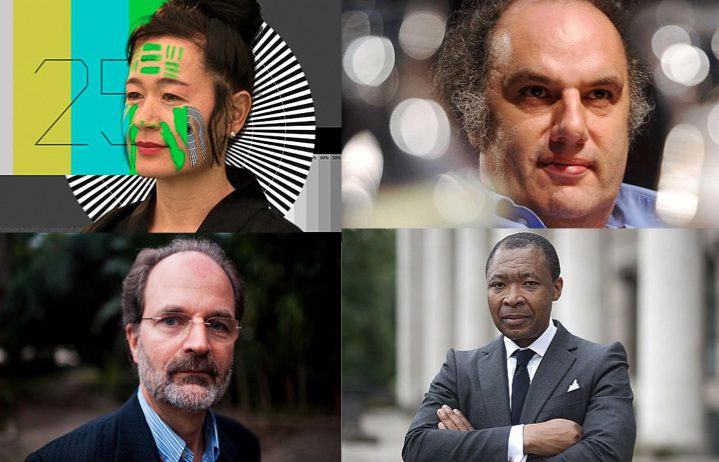Haus der Kunst, Munich, Germany
12 Feb 2015

Hito Steyerl, How Not To Be Seen: A Fucking Didactic Educational.MOV File, 2013; Matthias Lilienthal, photo DPA; Joachim Bernauer, photo Miguel Manso; Okwui Enwezor, photo Andreas Gebert, 2011
The recent killings of journalists and police guards in the Paris offices of the satirical French magazine « Charlie Hebdo » have brought to public debate fresh appraisals of the relationship between intolerance, free expression, censorship, and the right to offend sensibilities, be they cultural or religious, political, or ideological. But there is not always an easy distinction of where to draw the limit of free speech and who has the right to impose a limit on expression, regardless of how offensive such expression may be deemed.
At the same time, questions posed by the killings in Paris can be analyzed from the view of the current conflicted state of global, multicultural societies. This issue becomes urgent, particularly when giving offence converges with intolerance under the guise of free expression. But is there a point when offensive images, expressions, and representations become intolerable? Is intolerance of certain types of expression the same as censorship of thought? Can there ever be a limitless sphere of free expression in today’s increasingly plural, multicultural, transnational, and global societies? These questions are all the more pertinent within the realm of artistic and cultural practice, particularly as they meet at the point where institutions must provide an open and unrestricted space for challenging ideas and concepts.
To undertake a reflection on these points, Haus der Kunst is pleased to convene an evening panel with three leading thinkers to engage in a discussion that will illuminate the critical questions that arise from these topics. Panelists are Matthias Lilienthal, Hito Steyerl, and Joachim Bernauer; the moderator is Okwui Enwezor, director Haus der Kunst.
Thursday, 12th February 7:30 pm
with Joachim Bernauer, Matthias Lilienthal, and Hito Steyerl; moderated by Okwui Enwezor
In cooperation with Goethe-Institut
In German and English
Admission free
Joachim Bernauer (born in 1961) is the director of the Goethe-Institut’s department of culture. He studied voice, German literature, art history, and philosophy in Berlin, and wrote his PhD dissertation on the poetry and poetics of Friedrich Schiller (« Beautiful World, Where Are You? » Berlin, E. Schmidt, 1995). With Curt Mayer-Clason, he translated « Portuguese Poetry since Pessoa » (Tabacaria No. 4, 1997). From 1999 to 2002 he was head of the Villa Aurora artists’ residency in Los Angeles. This was followed by six years as program director for the South America region at the Goethe Institut São Paulo. He then became director of the Goethe Institut Portugal and, from January to October 2014 was head of the film, television, and radio department at the Goethe-Institut’s head office in Munich.
Matthias Lilienthal (born in 1959 in Berlin), director of the Munich Kammerspiele from September 2015, has worked as a freelance journalist, the assistant director at Vienna’s Burgtheater, dramaturge at the Basel Theater and longtime chief dramatic advisor and formative creative consultant at Frank Castorf’s Volksbühne in Berlin. From 2003 to 2012, he made a name for himself internationally as the artistic director of Berlin’s HAU (Hebbel am Ufer), which was founded in 2004 and named « Theatre of the Year » in 2012. Lilienthal produced more than 1,000 productions in his nine years at HAU, or 120 per season. In 2014 he was both a professor in Beirut and festival director of « Theatre of the World » in Mannheim.
The filmmaker and author Hito Steyerl (born in 1966 in Munich) lives and works in Berlin. In her essay-like documentaries, installations, and texts she explores issues of globalization, feminism, and postcolonial criticism. Her work is situated at the interface between film and the visual arts, theory, and practice, and has been exhibited worldwide at numerous film festivals and art exhibitions. She participated in Documenta 12 in Kassel and will also contribute in the German Pavilion at the Venice Biennale in 2015. In addition to her artistic work, she teaches media art at the Universität der Künste in Berlin and has lectured at institutions including Goldsmith’s College, London, and at the Center for Curatorial Studies, Bard College, Annandale-on-Hudson.